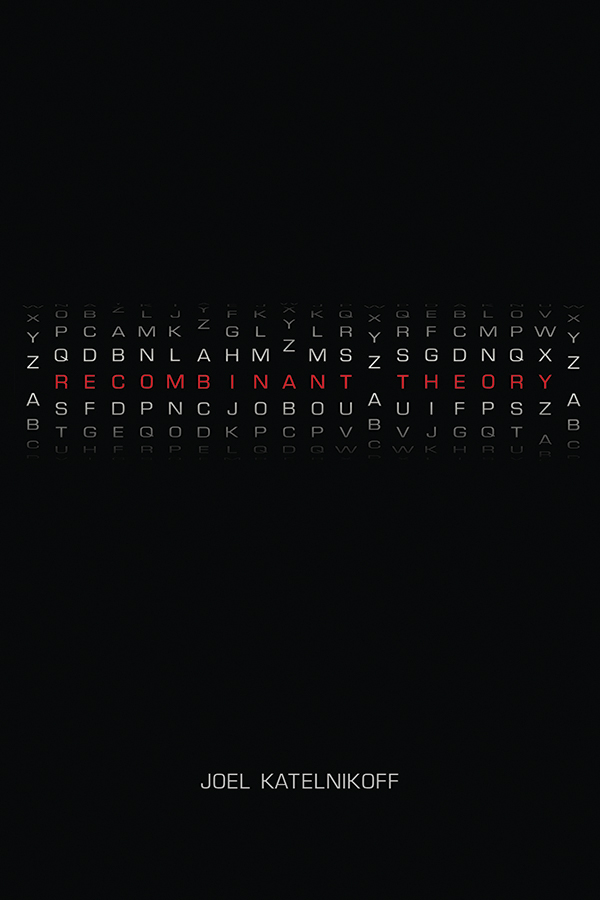
Recombinant Theory
Joel Katelnikoff
$56.99 HC / $26.99 PB (T)
112 pages
6 x 9 inches
Hardback: 978-1-77385-578-3
Paperback: 978-1-77385-579-0
Epub: 978-1-77385-581-3
Library PDF: 978-1-77385-580-6
October 2024
A bold new approach to critical writing through cut-up techniques welcoming readers into a living network of some of the most important contemporary poet-theorists.
Recombinant Theory is a collection of literary essays that challenge how readers interact with and perceive text, context, and critical writing. Working with printed pages and scissors, Joel Katelnikoff applies literal cut-up techniques to the complete works of ten contemporary poet-theorists: Annharte, Charles Bernstein, Christian Bök, Johanna Drucker, Lyn Hejinian, Steve McCaffery, Erín Moure, Sawako Nakayasu, Lisa Robertson, and Fred Wah. He then compiles the cut-ups into new essays, each reflecting the concepts of the original text while producing new lyric and theoretical formulations.
Using the techniques of constraint poetry as a path to theoretical writing, Katelnikoff creates a methodology that is uniquely true to poststructuralist thought. These recombinant essays do not attempt to present a singular transparent message and do not insist on their own authority. Instead, they function as a catalyst for critical analysis. Recombinant Theory is a vast database of material to be searched through, replete with unexpected connections and surprising combinations ready to be discovered and considered.
Recombinant Theory is a daring movement away from a critical model that claims to speak on behalf of a text. It rejects the idea of critical writing as a simple transfer of information from one person to another, instead inviting collaboration and engagement. This an act of poetic theory that disrupts the expected with its radical recombination and its readers to discover their own diverse paths through the materials of the texts.
About the Author
Joel Katelnikoff holds a PhD in literary theory from the University of Alberta. He began working on Recombinant Theory in 2015. He has presented on his work at academic conferences and poetry festivals in Edmonton, Calgary, Victoria, Vancouver, Toronto Philadelphia, Washington, Ireland, Wales, Sweden, Poland, and Slovenia.
Katelnikoff uses individual lines and phrases in a way that reveals the common themes of the writers in question while also yielding something a bit new.
—The Temez Review
Katelnikoff offers critique through repurposing the language being critiqued, taking the process a whole other level, writing essays from the inside . . . It’s a fascinating process, and a fascinating read.
—rob mclennan
This book’s proof / that we were there
Before, and in each visit / hallucinating
Eons, wordly, as attempts, only sumps
Each time we said this is new, knowing
It was only so / in its momentality
I dreamed through it / living as leaving
and so will you, after the conferences
Tripped out over the lands brokered,
Caps cupped, steaming the gloss for now
—Ara Shirinyan, writer of Your Country is Great<
These are texts from the other side of the author function (where the quick vox jumps over the lazy logos). Joel Katelnikoff spins texts, assembles new utterances that seem to simultaneously speak from the poet permutated and toward this essay project, this next text. The pronouns grow dizzy, ‘a vortex of conferences.’ Who remains waiting in these words? With a shock, these frankenlines come alive. The textual DNA spliced, reformed AND rewritten into new thinking that could only have occurred through this exact process. In Recombinant Theory, a monster surges forth, a new freedom is sung.
—Gregory Betts, editor of Avant Canada: Poets, Prophets, Revolutionaries
Joel Katelnikoff’s Recombinant Theory reads like it was produced by an hallucinating AI language model fed nothing but Language Poetry, conceptual writing and post-structuralist thought. The difference is that these texts are handmade word sculptures that transform theory into art. The book is beautifully designed and the various remixes are broken up into readable chunks that make for on-the-fly micro-doses of language tripping!
—Mark Amerika, writer of remixthebook
Joel Katelnikoff’s Recombinant Theory is the book of the future: a manifesto for resistance to authority mixed with a book of light as generative as a cascading perceptual experience. In Katelnikoff’s alphabetic spire of ink, a limitless genre grows, allowing the reader to dwell in freedom and creativity, discovery and invention, the interplay of chance and the worlds of tomorrow.
—Daniel Scott Tysdal, writer of The Mourner’s Book of Albums